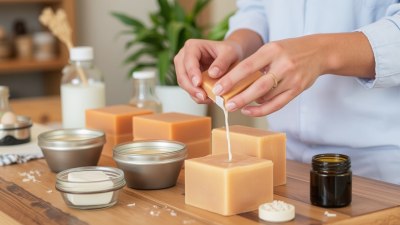Learning to Make Local Soaps and Lotions in Workshops
Discover the art of crafting local soaps and lotions in hands-on workshops. Enhance your skills and enjoy natural skincare.

In recent years, there has been a growing interest in handmade soaps and lotions, drawing people from all walks of life into workshops where they can learn the art of crafting their own personal care products. These workshops not only offer a creative outlet but also allow participants to dive into the world of natural ingredients and sustainability.
The Benefit of Making Your Own Products
One of the primary motivations behind attending soap and lotion-making workshops is the desire for control over the ingredients used in personal care items. Many commercial products are laden with chemicals and synthetic materials, which can be harmful to the skin and the environment. By learning to create your own soaps and lotions, you can ensure that only the purest and most beneficial ingredients are included. Additionally, making your own products can be more cost-effective in the long run and allows for a unique signature scent or formula tailored specifically to personal preferences.
Many workshops provide a variety of natural ingredients to choose from, allowing participants to experiment with different combinations. Common base ingredients for soaps include oils such as coconut, olive, and palm oil, while lotions often use butters like shea or cocoa and emollients like jojoba oil or almond oil. Participants can enhance their creations with essential oils, natural colorants, and botanical extracts to achieve desired textures, scents, and properties.
Workshops can vary significantly in length and focus. Some are designed for complete beginners and cover the basics of cold-process soap making, while others might dive deeper into more advanced techniques like hot-process or melt-and-pour methods. Lotions and creams often feature emulsification techniques, where participants learn the science behind mixing oil and water effectively.
Many workshops are structured around specific themes, such as seasonal ingredients or specific skin concerns, like sensitive skin, eczema, or anti-aging. This thematic approach can help attendees create targeted products that meet their individual needs.
While engaging in soap and lotion making is fun and fulfilling, safety is a crucial aspect of the process. In soap making, participants will learn about lye (sodium hydroxide), which is a key ingredient in cold-process soap. Safety precautions should be observed, such as using gloves, goggles, and ensuring proper ventilation. In learning about lotions, understanding the importance of cleanliness, particularly when it comes to tools and storage, is vitally important to avoid contamination.
Attending a workshop typically begins with a brief introduction to the history and benefits of handmade soaps and lotions. Instructors often share insights about the properties of various ingredients, how to select the best ones for specific skin types, and crucial techniques to produce high-quality products. Workshops often strike a nice balance between education and hands-on practice, ensuring that participants leave with not just knowledge but tangible products they have crafted.
Beyond the practical skills learned, these workshops foster a sense of community among attendees. Participants often share their personal stories, skin care challenges, and aspirations, creating bonds over a shared interest in natural beauty. This social aspect can enhance the learning experience and inspire creativity beyond the workshop itself.
When looking for a workshop, consider factors such as the reputation of the instructor, the materials provided, and the overall structure of the course. Reading reviews and perhaps attending a preview or introductory session can also be beneficial. It’s essential to choose a workshop that aligns well with one's experience level and personal skincare goals.
Another crucial element of making your own soaps and lotions is sustainability. Many workshops emphasize the use of local and organic ingredients, which not only supports local farmers and businesses but also reduces the carbon footprint associated with transporting ingredients. This commitment to sustainability can extend beyond the products themselves, influencing packaging choices, such as using reusable or biodegradable materials.
After completing a workshop, many individuals find themselves inspired to continue their journey into the world of handcrafted skincare. This can lead to further learning opportunities, such as online courses or local meet-ups for enthusiasts. Some may even choose to turn their newfound skills into a small business, selling their soaps and lotions at local markets or online platforms. The potential for creativity and entrepreneurship becomes almost limitless.
One of the most rewarding aspects of making your own soaps and lotions is the personal touch it adds to your skincare routine. Unlike mass-produced products, handmade items can carry sentimental value, often reminding you of the enjoyable learning experience or the wonderful people you met along the way. Additionally, gifts made from personal creations can be unique and thoughtful, offering friends and family something truly special.
Learning to make local soaps and lotions in workshops provides a wonderful opportunity to explore creativity, sustainability, and personal care. The skills gained in these classes can have lasting effects, allowing participants to enjoy the satisfaction of crafting their own products for years to come. As you embark on this journey, remember to embrace the process, enjoy experimenting with ingredients, and connect with others who share your passion for natural beauty.











